The Commander & The Chief
A Moment in Gaming Reveals Our Moral Decay
Microsoft recently announced that they are remaking one of the greatest franchises of all time, Halo: Combat Evolved. This game became a cultural phenomenon overnight in 2001, shortly after the 9/11 terrorist attacks. Approximately 25 years later, the video-game remake was announced, and social media was flooded with commentary, memes, and angry posts of men who have failed to realize that they are no longer the gaming industry’s target market.
One of the best posts came from the Whitehouse social media accounts. Here, you see the President saluting the flag, wearing the same suit as Master Chief. In the games, you never see Master Chief take off his helmet, and so the Whitehouse appears to be insuniating that the man behind the mask has always been Donald J. Trump. Solid troll…
I found myself thinking about buying a console just so that I could play Halo with my son. A few years ago, I bought him some of the action figures from the franchise, and he thought they were so cool that he wanted to go as Master Chief for Halloween this year! My heart grew three sizes that day. But not all reactions to the news were as wholesome as mine or my son’s child-like excitement when he “suited up” and grabbed a Nerf blaster to go find buckets of candy.
First, there were the leftists, shrieking on the internet that the Whitehouse Comms Team was politicizing a video game, because that has never happened before:
While many people were thrilled to see this gaming masterpiece slated for a remake, others demonstrated serious cultural maladies.
Master Chief, Dads, and Heroes
America has produced a pantheon of fictional heroes in the pages of DC and Marvel comic books. The two that are the most popular are Batman and Superman (sorry, Marvel). But in 2001, shortly after the terrorist attacks of 9/11, a new hero was born, but he may have been the last one.
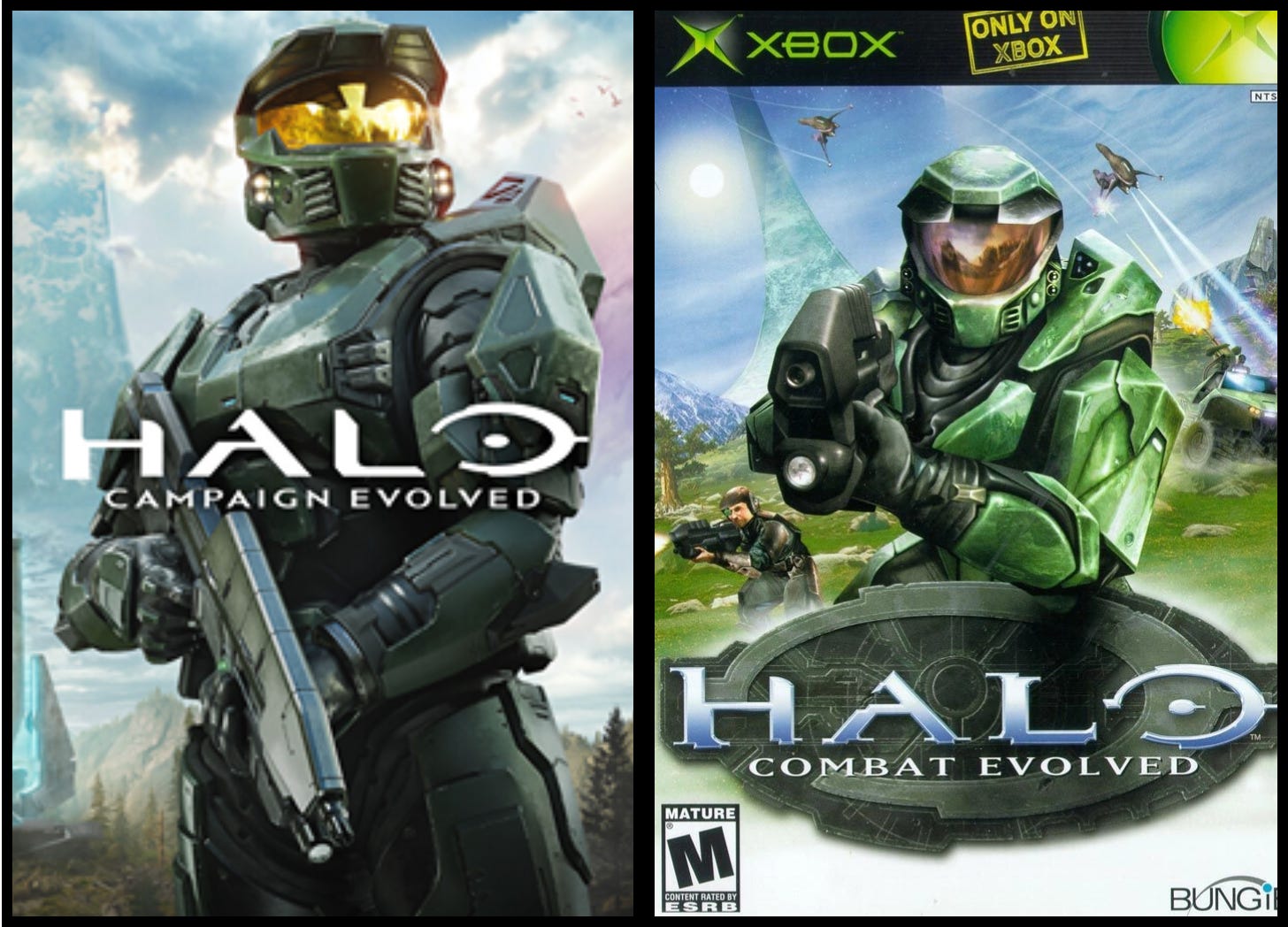
Master Chief is a stoic hero. He rarely speaks, but when he does, he never gets nervous or shows he’s afraid. When he is tortured, he never screams in agony, and his visor hides any pain that would show on his face. He is the kind of hero that makes you just want to be courageous.
He had a “helper,” an AI partner named Cortana who assisted him in all his missions — he was the muscle, and she was the brain. Their enemy was the Covenant: a radicalized religious alien race set on finding a weapon called “Halo” to destroy the entire human race as foretold in their prophecies. To them, Master Chief was the “Demon,” but to the player, Master Chief was a hero that their generation had contributed to American cultural identity.
Master Chief’s story was compelling because, like a cross between Batman and Superman, Chief was vulnerable like a human, but strong like a super soldier, and yet he was not Superman. You always thought he could die, and sometimes you thought he had, only to discover that fate would say “not yet,” and the story would continue.
You knew it was fake and “unbelievable”, but it accomplished what many stories aim to do but few can, and that is: instill in the player, reader, or viewer a suspension of belief that makes them feel as if “it could be real,” even though you know there is no chance it ever will be.
Master Chief became the last modern hero that was universally recognized across generational divides. As Matt Walsh recently discussed, we used to have a shared culture or “monoculture,” where we all knew, whether for good or ill, what was culturally relevant. Master Chief is one of those last vestiges of monoculture that has slowly died off. This game had such an impact on the country that those young men who played it growing up are now running the Whitehouse communications and using it to troll their political opponents. It’s even rumored that J.D. Vance was a big Halo fan at one point, but I have yet to verify this.
Needless to say, the announcement of the launch shows that Master Chief may have been the last modern hero that isn’t woke — woke heroes don’t exist; they are a contradiction.
The Halo remake also demonstrates that you cannot recapture your childhood excitement for a game once you hit a certain age. It may spike for a moment, but then it fades, and you realize you have more important things to consider. This is one of the joys of having kids. You get to share your childhood with them! Finally, it appears that a large portion of people expressing disappointment about this game have no kids at all to share it with. And that is a real problem.
Are We Going Up or Down?
A sign of a thriving culture is an understanding of virtue as manifested in the mythological heroes your culture creates and elevates. The hero is an “incarnation” of your culture’s value set displayed in the ideal “citizen” or “soldier.” When the hero overcomes the agreed upon evil, against all odds of course, the whole society cheers, goes home, and talks about the amazing experience they shared. Lord of the Rings, despite not following the books, delivered this in the theaters, and Master Chief delivered it in the homes of millions of gamers everywhere.
Show me a culture that can’t create heroes, and I’ll show you a society that is morally, spiritually, and politically confused, and most likely not having kids. This describes our own country, America. We are headed for a revolution whether we like it or not. It may be the case that this “remake”, not to be confused with a “remaster”, is another step in the Marxist revolution to destroy our American “icons.”
This destruction of icons is the hallmark of revolution. Historically, the groups that have done this are Marxists, Muslims, and Protestants. But more recent versions of this are more sophisticated, co-opting rather than destroying the heroes of a society. This is probably most obvious with Santa Claus, who was co-opted from the Catholic faith by materialist and secularist capitalists, or even the “rainbow” suits of armor that Microsoft displayed in the image above.
Radicals have already hollowed out our heroes and repurposed them for their political and spiritual agendas. In Catholic countries, Communism did this most effectively when it coopted the liturgical forms of the Catholic Church, and then implemented the same kinds of practices in their own political rites: processions, large canvas paintings, “votiv” candles, and even displaying their leaders’ bodies for “veneration.”
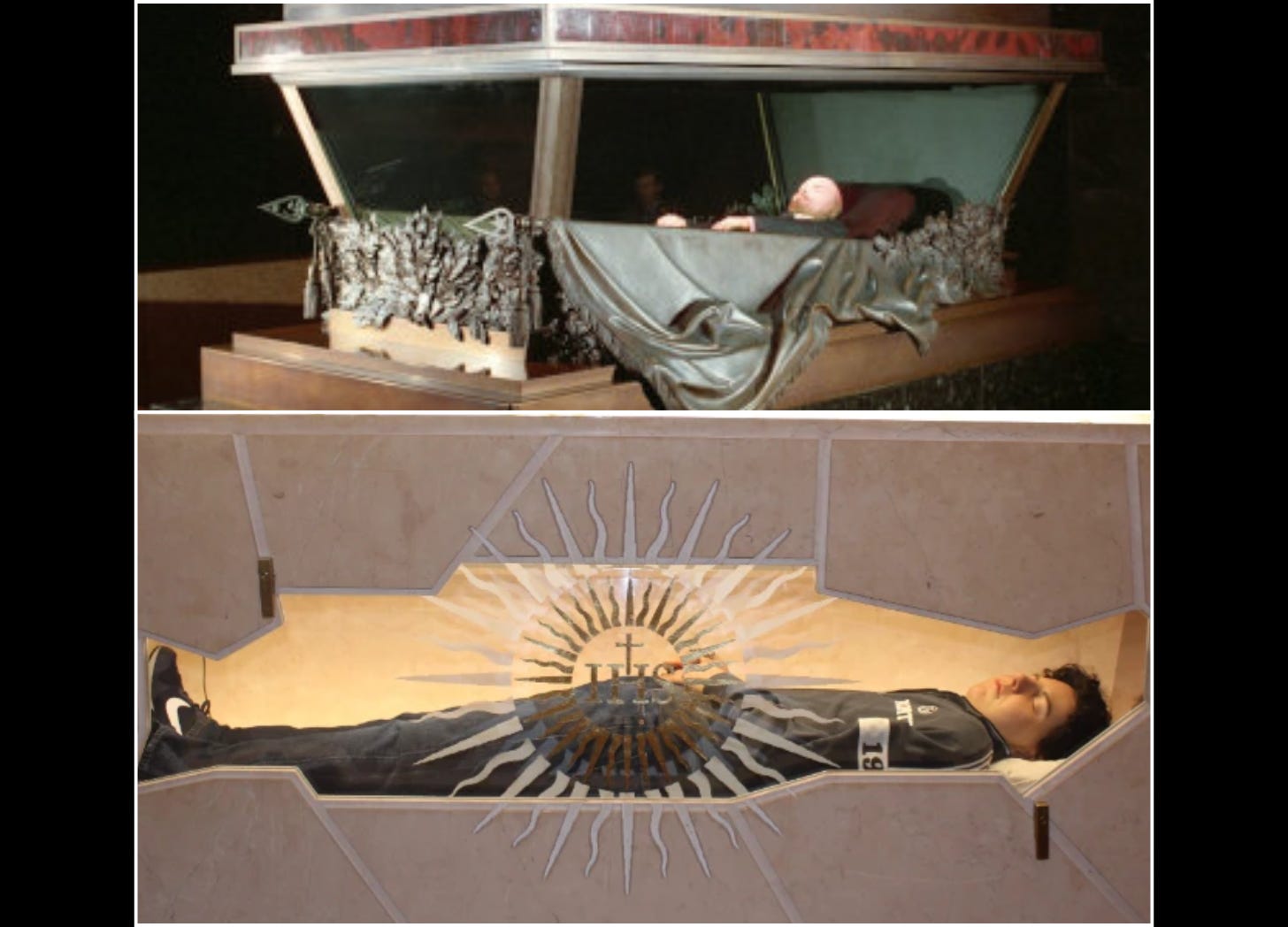
While few boomers were impacted by Master Chief the way their kids were, many of them will recognize the dark green super soldier when their grandkids show up wearing his merch — that is, of course, assuming their children have given them grandkids. Granted, they will associate Master Chief with the many times they found empty pizza boxes and cans of Mountain Dew strewn across the basement, but regardless, Halo and Master Chief impacted their entire family entertainment history.
For example, all my brothers bonded over this game while we were growing up under the same roof. My mom would make us cookies and milk, and we would play together, daydreaming about getting high-speed internet to play other players without split screens. When we moved out, we often kept in touch via Halo and other games over the internet. Needless to say, once our lives became too busy to play an hour or two with the “bros,” our communication and connection dropped significantly.
Halo was played by literally everyone. Youth groups were playing it for outreach events, college dorms were playing it instead of studying, and offices were having LAN parties in the IT department while they worked. It’s exciting because we could see a resurgence of social gaming happen for the next generation as adults share the “classics” they had as kids with their own. But it also may be a memorial to one of the last American icons that united generations around a story of courage, perseverance, and hope against all odds. In other words, the next generation may have to actually fight for their own country’s right to exist, rather than just imagine that fight through the eyes of Master Chief defending humanity’s right to exist.
There was a saying I read once, “When the gods are angry with the people, they give them crazy leaders.” We are seeing this play out in real time. New York City is about to elect a Muslim Communist, and he will take office during the 25th anniversary of 9/11. This is the financial capital of America, and it is about to become one of the biggest wins for American Communism in the history of the United States.
The first time Muslims attacked New York City, Microsoft launched the most iconic franchise in recent memory. Now, New York is under attack again, and they are relaunching the same game that preceded the war on terror.
The only question now is, will Master Chief inspire the next generation of young boys to “Finish the fight,” or is it one last hurrah for a group of middle-aged men pining for the good ole days of their youth before the lights of liberty go dim?
Only time will tell.
— DR


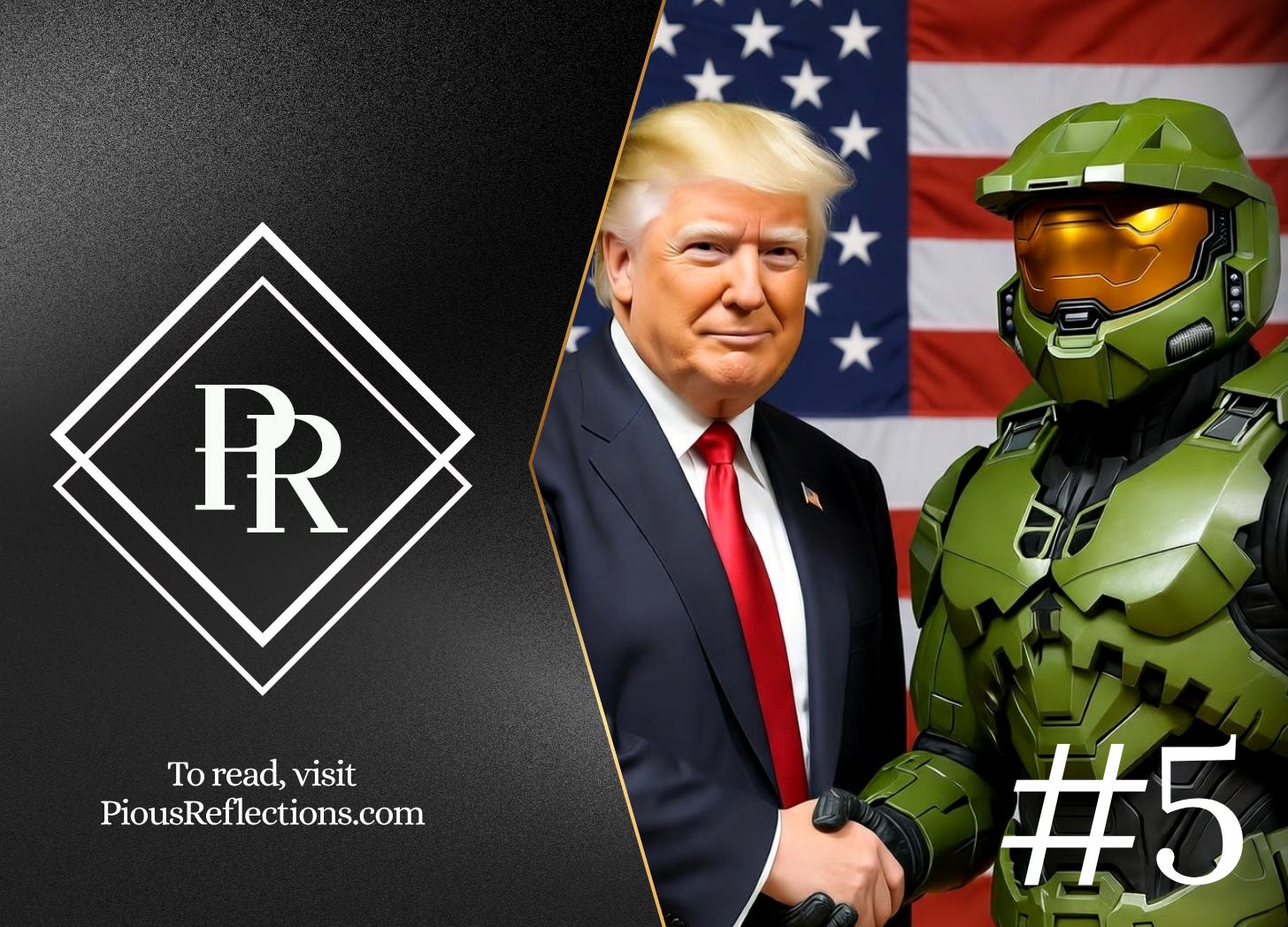
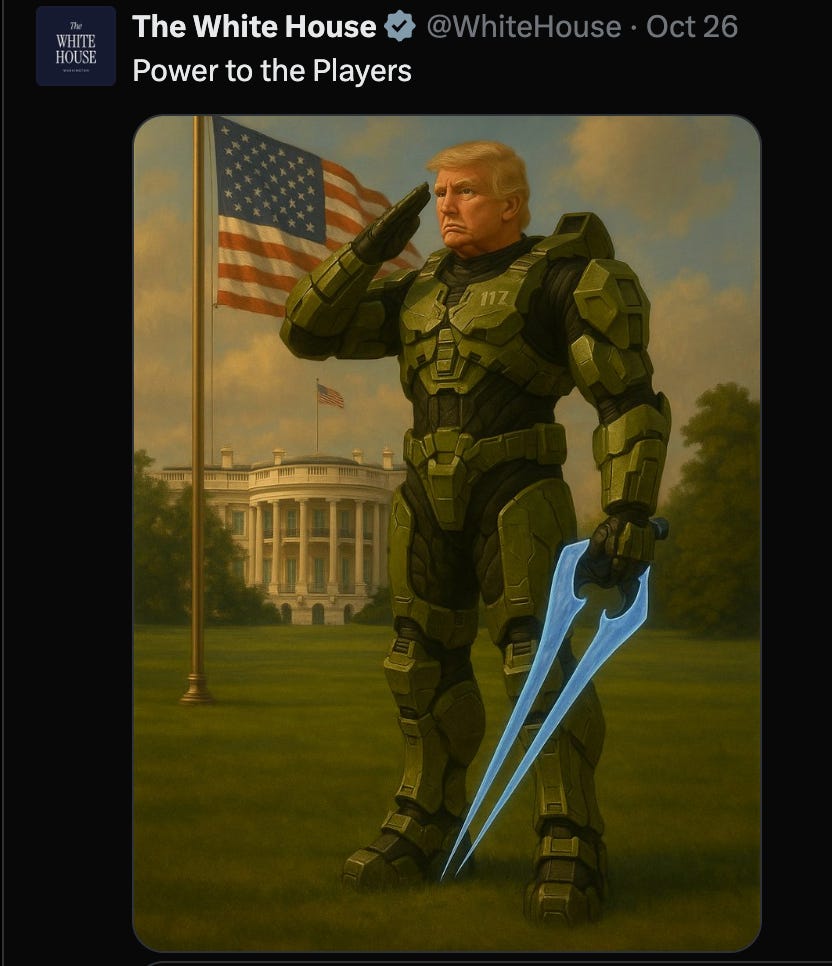
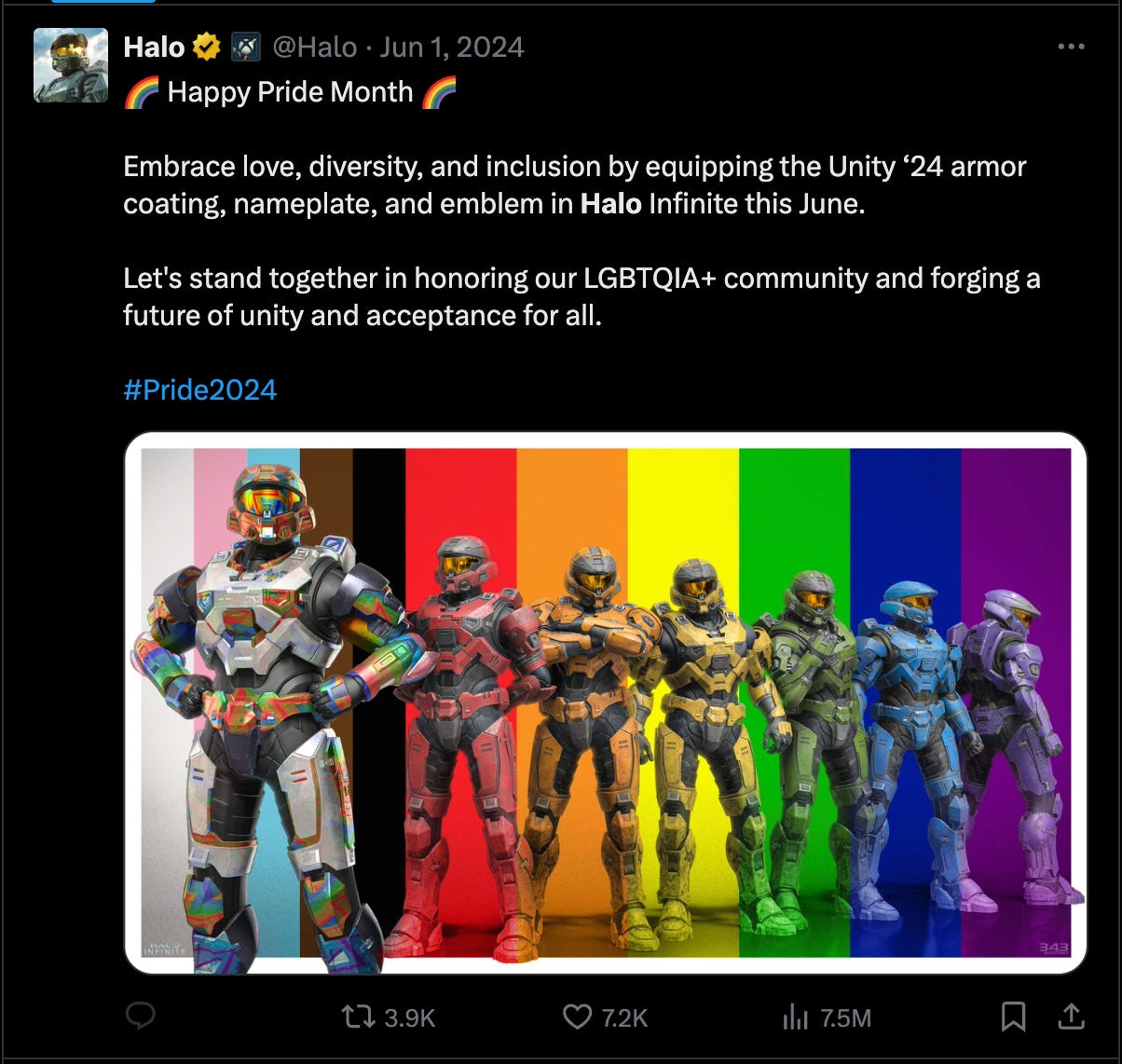
What are some of the cultural heroes that you think need to be resurrected? Let me know!
We don’t have heroes anymore. The hero has been replaced with the victim. All the Western heroes—Charles Martel, Christopher Columbus, George Washington, etc.—are attacked with the most vile accusations and to be replaced with a real or imagined oppressed victim. In modern America being a member of an alleged victim group gives status and power.
The attack on our heroes is a strategy of the liberal left to completely deracinate the American people. Talk to a young adult today and he may tell you “we have no culture”. Once the American people have been completely disconnected from their history and traditions it is much easier for the revolutionaries to obtain power.
I played Halo 1 and Halo 2, but it was the original I played the most. Hours of playing in my college dorm room. The pistol was over powered if you had good aim. Three shot kills every time if you were good at it. However, despite the numerous hours I played Halo, I didn’t follow the story because I don’t know who Master Chief is.